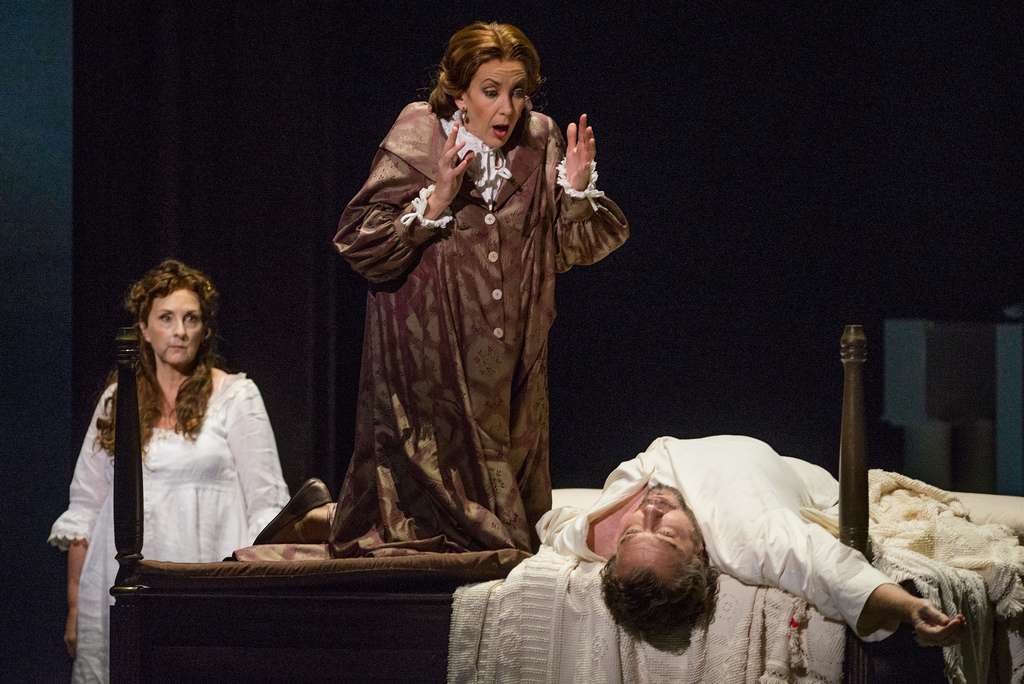|
Back
A good show! Miami
Adrienne Arsht Center for the Performing Arts
11/16/2013 - & November 17*, 19, 23, 2013
Martin David Levy: Mourning Becomes Electra
Rayanne Dupuis (Lavinia), Lauren Flanagan (Christine Mannon), Morgan Smith (Adam Brandt), Keith Phares (Oin Mannon), Kevin Langan (Ezra Mannon), Riley Svatos (Helen Niles), Thomas Lehman (Peter Niles), Nelson Martinez (Jud)
Florida Grand Opera Chorus, John Keene (chorus master), Florida Grand Opera Orchestra, Ramón Tebar (conductor)
Kevin Newbury (director), Anya Klepikov (scenic design), Camilla Haith (costume design), Robert M. Wierzel (lighting design)

L. Flanagan, R. Dupuis & K. Langan
(© Justin Namon/Florida Grand Opera)
Florida Grand Opera has taken a big risk by doing a late 20th century opera. This is a challenge for traditionalists, which is most of us. But a satisfying night in the opera house can be had if the libretto is solid. People make fun of the silly stories in Bellini operas, but it is undeniable that they were well composed with clearly defined characters and motivations. On the other hand, with more modern composers, we often get decent librettos with unmemorable, or more accurately, unhummable music, so it is only fair to understand an audience’s apprehension.
Eugene O’Neill’s Mourning Becomes Electra is rarely staged anymore. Even with doubling and tripling minor characters, it is hard to do it without at least ten actors making it expensive. Based as it is on the Oresteia of Aeschylus, there is no significant romance and any eroticism involves incest. This is not a comfortable play. No one feels good by the end. And O’Neill was not one for comic relief - forget humor. Though it sounds nothing like it, this opera is comparable to Pelléas et Mélisande in that its success comes more from the creation of appropriate moods than by achieving particular fireworks from the singers or orchestra. The text most certainly is what is most important and, luckily for composer Martin David Levy, Henry Butler’s libretto never calls attention to itself as is so often the case with the operas of the last hundred years. The words of the text are simple; in fact, in reading it, I think the only four-syllable words I found were “Lavinia” and “adultery.”
The opera is gripping throughout the first act and into the second until Christine’s suicide; then it becomes lugubrious. The fault is O’Neill’s more than Butler’s and Levy’s. Lavinia and Orin are now the main focus. Neither is sympathetic or interesting. And we still have forty-five minutes to go. Musically people often criticize modern opera for sounding like “movie music”, but for many of us that can be a good thing. Levy wrote some very stirring leitmotifs and his highlight, the second act quartet, is quite moving which says a lot since supertitles alone in ensembles can never tell the whole story. Levy’s creation of evident doom packs a punch.
Whatever one’s feelings about the piece, no one can deny that this production is exceptional. The costumes are suitable to period and particularly useful in adding to the moods. The scenic design staggeringly depicts the Mannon mansion as a sort of doll’s house which we see being manipulated by a very young and probably not yet emotionally abused Lavinia. Projections often fill frames on either side of the stage suggesting changes in season or the omnipresence of various members of the Mannon family. But the eerie elegance in Robert M. Wierzel’s lighting design is what gives the production its most significant visual impact.
The cast has no weak links, only members who are truly committed to the piece. Especially interesting is Morgan Smith making a rather sympathetic bad guy. His diction is particularly clear and this handsome man makes his love and lust for the older Christine absolutely believable in spite of his other motivations. Kevin Langan makes the short role of Ezra one that looms over us not just because of the constant sight of his projections. Before his death, Langan gives Ezra’s admission of his errors as a husband such honesty that our opinion of him is turned upside down. Rayanne Dupuis and Keith Phares have the toughest roles not just because of their characters’ whiney, selfish natures but their tessituras sit higher making it more difficult to make the text understandable. But this opera belongs to Christine, its most compelling character. She is a woman who has been damaged by a loveless marriage and makes a courageous risk for true passion. By making the unwise choice of murder, she sets everyone on his path to destruction, but the great Lauren Flanigan makes us find pity for her. Christine could easily be the villainess of the piece; how boring. Flanigan trusts that the audience’s 21st century sensibilities will kick in making us see Christine as the tale’s real victim. Having seen Flanigan several times in the last twenty years, I hear no aging in the voice; she maintains the focused power that has always made her one of opera’s most powerful actresses.
Along with a brilliant physical production, Kevin Newbury’s direction makes the story clear yet maintains the ambiguity that is essential in O’Neill. With its lack of recognizable tunes, modern operas sometime seem to conduct themselves. Ramón Tebar’s guidance must be particularly appreciated by the cast who could easily fall all over the place.
Florida Grand Opera’s General Manager, Susan Danis (in the first season when her repertory decisions are presented), has made a bold choice with this opera. She is showing that she believes the community is ready to make a giant leap into the less familiar. Let’s hope it works better than it did a decade ago when even exploring atypical Mozart was considered outrageous by the old timers. But look at the rest of the season’s repertory: Tosca is the only chestnut, joined by the less familiar (but still richly melodic) Nabucco and Thaïs. Danis shows confidence in what Miami can handle. Onward and upward, Ms. Danis!
Jeff Haller
|